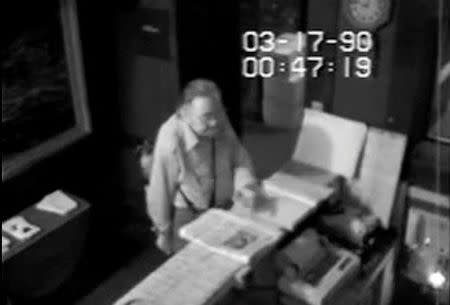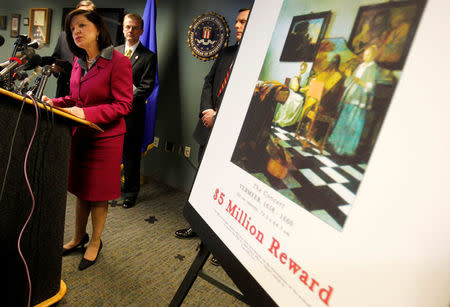Accused mobster tied to Boston art heist pleads guilty to gun charge
By Andy Thibault HARTFORD, Conn. (Reuters) - An 81-year-old accused mobster who prosecutors believe may hold some of the last remaining clues needed to solve the largest art heist in U.S. history pleaded guilty on Thursday to illegally selling guns, but did not say a word about the missing art. Robert Gentile admitted to illegally selling a loaded firearm to a convicted killer, the result of what his lawyer calls a Federal Bureau of Investigation sting operation aimed at pressuring him into providing details on paintings stolen from Boston's Isabella Stewart Gardner Museum in March 1990. The accused mobster, who appeared in Hartford federal court in a wheelchair, wearing an untucked T-shirt and rolled-up khaki pants, made his plea after U.S. District Judge Robert Chatigny first held a hearing to determine if he was competent. "It's good, it's good. I know what's happening," Gentile told the judge. He also bemoaned the two years he has spent in custody since his 2015 arrest, telling prosecutor John Durham: "You should feel sorry for me and my wife." Gentile has repeatedly denied knowing the whereabouts of any of the art valued at an estimated $500 million taken in one of the longest unsolved high-profile crimes in Boston and did not address the matter during the hearing. But during a polygraph test performed as part of the Gardner investigation, Gentile had an intense reaction when he was shown images of the missing paintings, while he remained calm when shown unrelated artwork, according to a law enforcement source briefed on the test. Gentile's attorney, Ryan McGuigan, disputed the validity of the test. An FBI spokesman in Connecticut did not respond to a request for comment. He is due to be sentenced on Aug. 25, and could face up to almost six years in prison, though McGuigan said he was looking for half that. The Gardner heist was carried out by two men dressed in police uniforms who apparently overpowered a night security guard who had buzzed them in. None of the 13 stolen artworks, which include Rembrandt's "Storm on the Sea of Galilee," and Vermeer's "The Concert," has been recovered. At a 2015 hearing, prosecutors said Gentile was secretly recorded telling an undercover FBI agent he had access to at least two of the paintings and could sell them for $500,000 each. A 2012 search by the FBI of Gentile's home turned up a handwritten list of the stolen art, its estimated value and police uniforms, according to court documents. (Writing by Scott Malone; editing by Tom Brown, G Crosse)

 Yahoo News
Yahoo News 

